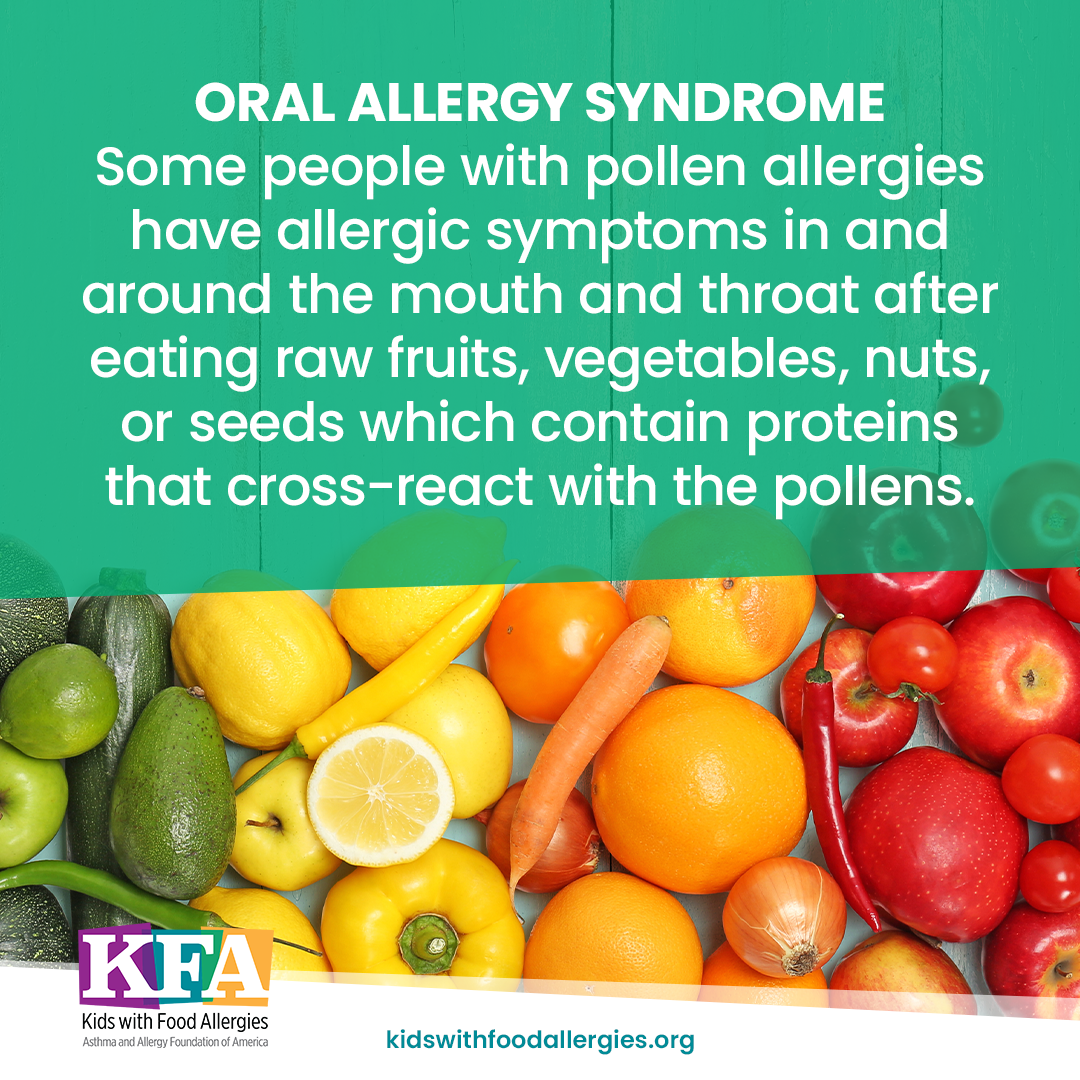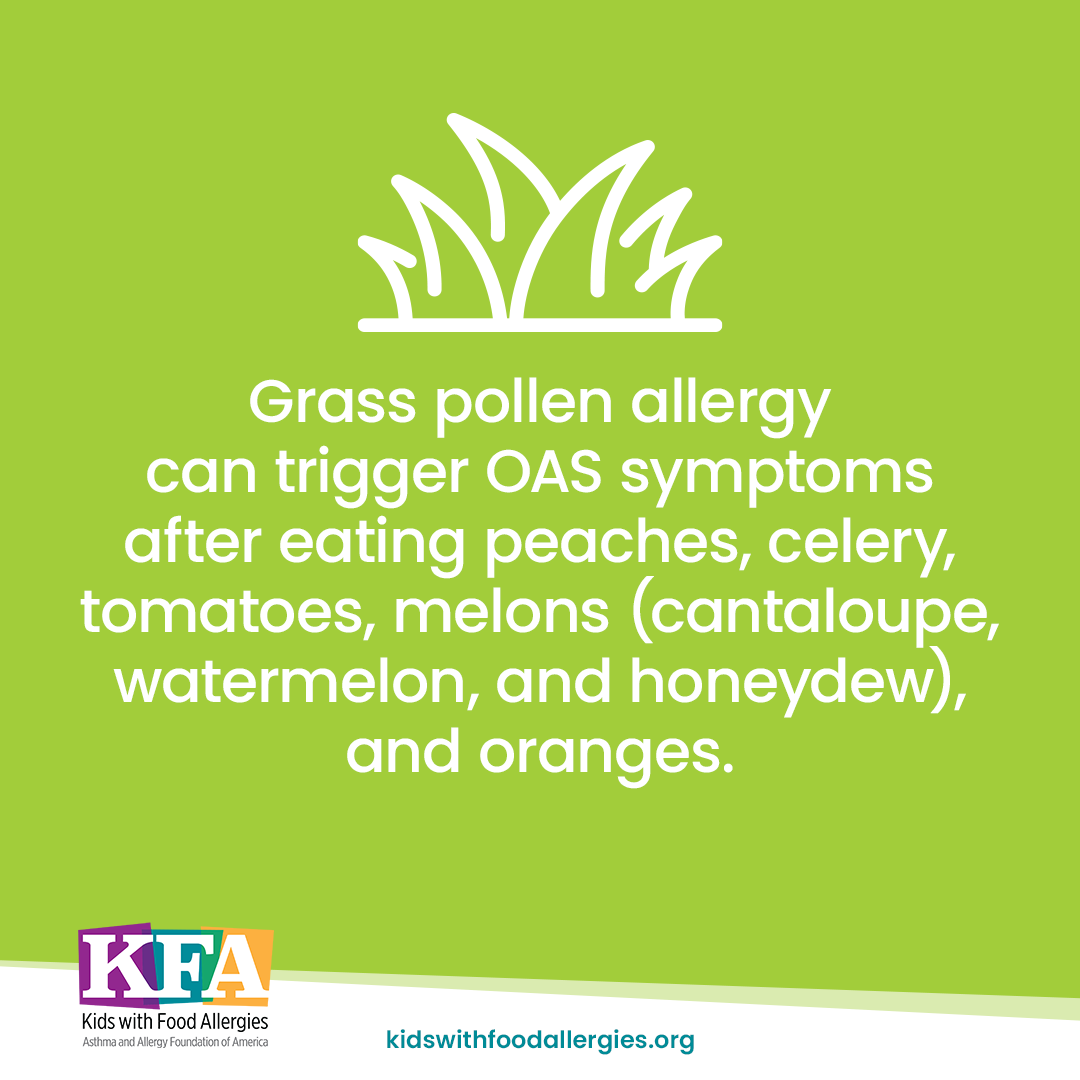Did you know a pollen allergy can be responsible for a type of food allergy? If your child complains about an itchy mouth or throat after eating certain fruits or vegetables, their symptoms may actually be related to a pollen allergy. This is called oral allergy syndrome (OAS). It is also sometimes called pollen-food allergy syndrome (PFAS).
Symptoms of Oral Allergy Syndrome
With OAS, your child may have some of these symptoms after eating certain raw fruits, vegetables, seeds, or nuts:
- Itchy or tingling mouth, tongue, or throat
- Swelling of the mouth, lips, tongue, and throat
- Hives where the food touched their skin
Because some OAS symptoms are similar to IgE mediated food allergy, they can be confusing. Most of the time, OAS reactions are not severe. But rarely, OAS can trigger a severe allergic reaction called anaphylaxis [anna-fih-LACK-sis]. It is important to know if your child has OAS or a food allergy and how to treat it.
Pollen and Oral Allergy Syndrome
OAS is a form of contact allergic reaction. This happens because of cross-reactivity to pollen. In OAS, your immune system confuses the pollen of certain trees and grasses with similar proteins of certain raw vegetables, fruits, nuts, or seeds. The pollen is similar to the proteins in some foods, so your body can’t tell the difference. So if you are allergic to birch pollen, your body might think it’s invading them when you eat an apple.
Allergies to birch, alder, ragweed, mugwort, Timothy grass, and orchard grass pollen cause most OAS symptoms. If your child has OAS, their symptoms may be worse when these pollens peak.
Oral Allergy Syndrome and Anaphylaxis
The symptoms of OAS sound similar to anaphylaxis. So what’s the difference?
Anaphylaxis comes on quickly and usually affects more than one organ system (part of the body), such as the skin or mouth, the lungs, the heart, and the gut. Some symptoms include:
- Skin rashes, itching, or hives
- Swelling of the lips, tongue, or throat
- Shortness of breath, trouble breathing, or wheezing (whistling sound during breathing)
- Dizziness and/or fainting
- Stomach pain, vomiting, or diarrhea
- Feeling like something bad is about to happen
Anaphylaxis must be treated with epinephrine right away for the best chance of stopping the allergic reaction.
OAS symptoms, such as itching and tingling, are usually mild and mostly affect the mouth. The symptoms don’t last very long.
But call your doctor if your child’s OAS:
- Gets worse
- Happens when they eat nuts or cooked fruits and vegetables
- Triggers any of the above symptoms of anaphylaxis
If your child has OAS symptoms to nuts, this could actually be signs of anaphylaxis. See a board-certified allergist as soon as possible. Nuts are more likely to cause a serious allergic reaction.
What to Do If You Think Your Child Has Oral Allergy Syndrome
If your child has any food allergy or OAS symptoms, talk with a board-certified allergist. They can do allergy testing and review your child’s medical history to determine what type of food allergy your child has. If your child has OAS, the allergist may treat their pollen allergy with immunotherapy (allergy drops or shots).
If your child has a pollen allergy but doesn’t have symptoms when eating raw fruits and vegetables, they can still eat them. But if they do, you’ll want to avoid feeding those foods to them, especially when pollen is high. Talk with your child’s allergist to decide whether or not you need to remove these foods from your child’s diet. Your child may be able to eat the food cooked or with the skins removed.



Comments (2)